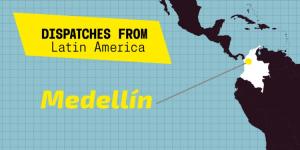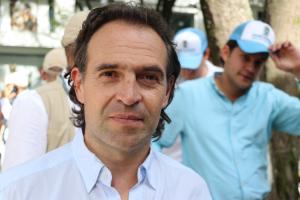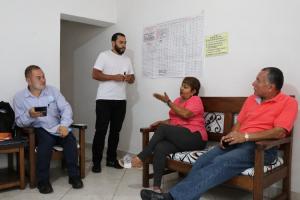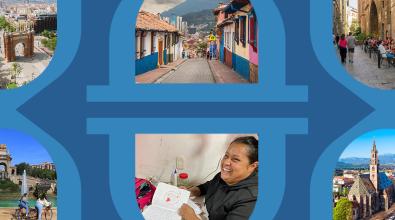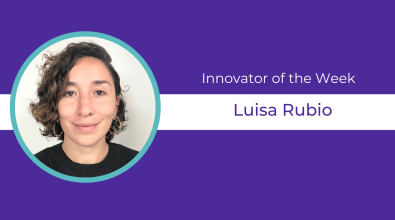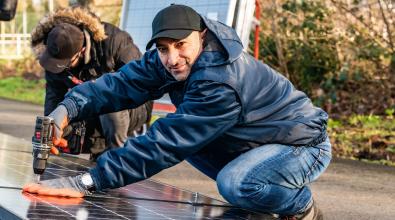How Medellín is breaking the grip of illegal lending
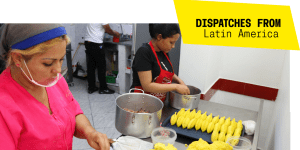
In the latest of our summer-long series checking in with the Latin American winners and finalists of the 2016 Mayors Challenge, Bloomberg Cities visits Medellín, Colombia, to learn more about the city’s micro lending program, Bancuadra.
Para la versión en español, haga click aquí.
When Medellín residents need to borrow a little money for home repairs or to start a small business, they typically have had little choice but turn to loan sharks tied to organized crime gangs.
It’s a risky move. Illegal loans known as gota a gota, or “drop-by-drop,” come with interest rates as high as 800 percent per year. Borrowers who fall behind on repayments can easily get trapped in a vicious cycle that leads to intimidation and threats to their personal safety.
“Illegal credit can ruin a family,” said María Fernanda Galeano, Secretary of Economic Development in Medellín, Colombia’s second largest city. “It’s an extremely complex problem, which risks their life, their house, and their family’s safety. People can reach this point because they can’t find a solution to something as simple as paying for a bus ticket.”
Medellín’s city leaders decided to fight back, on behalf of the mostly low-income residents who too often get stuck in this situation. They came up with Bancuadra, a safe and affordable microlending program that also includes training in financial literacy and money management. The initiative was one of the winning ideas of the Bloomberg Philanthropies 2016 Mayors Challenge.
The stakes are huge. Nearly 60 percent of Medellín’s 2.5 million residents make use of illegal loans. Similar loan networks have sprung up in other cities across Latin America.
“We have a moral responsibility here because many of the gangs and criminal organizations that have been present in Medellín were the ones who exported the drop-by-drop loan to other countries,” said Mayor Federico Gutiérrez. “Medellín will also provide the solution. And it’s something we can all do together.”
Since it launched in 2016, Bancuadra (it means “the world’s smallest bank”) has made more than 12,000 loans. A critical part of the model is that the loans are not given to individuals. Rather, they are given to groups of five to ten people — family members, friends, acquaintances — who form something called a “trust network.”
Each member of a trust network receives an initial sum of 200,000 Colombian pesos (about $62 U.S.) and can’t ask for another loan until all members have settled their debt. There’s a built-in incentive for participants to hold each other accountable and help each other out if someone falls behind on payments.
The interest rate of 0.91 percent per month is miniscule compared to the 30 percent that moneylenders charge. While the sums involved may seem low, even small loans can make a big impact on peoples’ lives.
Take Daniel Grisales, who used a loan from Bancuadra to invest in his small business — a shop selling empanadas. Grisales said the loan allowed him to upgrade the production plant in his store, buy uniforms for the workers, and bags for making deliveries. “It’s given me the opportunity to cover the costs of the empanadas shop,” Grisales said, “and sustain myself a bit financially.”
Grisales’ mother, Socorro, is part of Daniel’s trust network. She’s heard stories of people getting killed because they couldn’t pay back a drop-by-drop loan. “They tell me that they had to leave, how scary, how awful. If you don’t pay, who knows what can happen,” she said. Both have had to resort to these moneylenders in the past and prefer to not have to repeat the experience. “They charge very high interest rates. You settle into that and it’s not good,” said Daniel Grisales. “Now we feel very supported, very backed up. We feel safer.” He added that the payback of 10,000 pesos or roughly $3 U.S. per week is “within our reach.”
Another critical component of Bancuadra is education. Before receiving a loan, the members of each trust network must attend four classes on the basics of loans, accounting, and conflict resolution, among other things. Once the loan is given, they must participate in 12 more classes, led by loan agents in participants’ homes or businesses. Starting this year, all participants must open a savings account in order to receive a loan, a change intended to incubate a local culture of saving. As Carlos Mira, director of Fomentamos, the local organization Medellín partnered with to conduct the classes, put it: “The loan passes, but the knowledge stays and is passed on.”
Bancuadra has not put an end to illegal lending in Medellín. But for many people, it’s given them their first safe and affordable alternative — and a way out of the stranglehold of existing loans. Almost half of Bancuadra customers — 44 percent — have used their loan to settle up previous debts. Another 14 percent used the loan for education expenses, 13 percent used it to pay rent or utility bills, and 8 percent used it to invest in their businesses.
[Read: Pivoting with purpose: How to change course and keep innovating]
Veronica Montoya is technical director at the Banco de los Pobres, or “Bank of the Poor” — the city-run organization that oversees Bancuadra as part of a portfolio that also includes a loan program specifically for small businesses. She said Bancuadra is “promoting economic development for the city’s most vulnerable residents, while offering families “an alternative for stability.”
Liliana Galeano, the initiative’s director, adds that Bancuadra is helping the city collect valuable data about financial and social needs in the community. “The most valuable legacy is the knowledge,” Galeano said, pointing to the deeper understanding city leaders now have about what sorts of people need loans and their preferences regarding banking services. All of this, she said, will be “essential in order to develop more social projects.”
But the most rewarding experience of the project, Galeano continued, is the learning and trust-building she sees happening in the community. “Users tell us they signed up looking for money,” she said, “but then decided to stay due to the training activities and the people they have found in it.”
Juan Paullier is an Uruguayan freelance journalist. He worked for the BBC for almost a decade as a correspondent in Mexico, Central America, and Venezuela and also at the London and Miami offices.
Read more stories in this series:
- SANTIAGO: Why cities around the world should take notice of Santiago’s fight against childhood obesity
- ESTACIÓN CENTRAL: How one mayor and his city are tackling the immigration crisis
- ASUNCIÓN: Paraguay’s capital city takes the first steps toward counting — and including — its residents
- CURITIBA: A pioneer in busing, Curitiba now aims to improve transit options for the disabled
- BOGOTÁ: How Bogotá is making kids’ commutes safer, educational — and fun
- MEDELLÍN: How Medellín is breaking the grip of illegal lending
- GUADALAJARA: Guadalajara fights corruption — and changes the way it’s being built — one click at a time
- SÃO PAULO: As Amazon burns, São Paulo pushes sustainable agriculture
